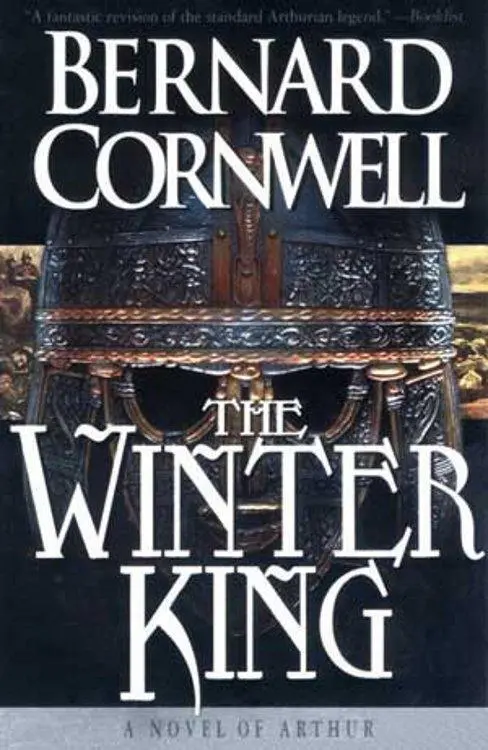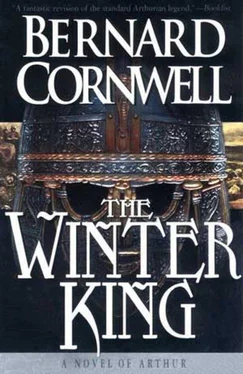THE WINTER KING
by Bernard Cornwell
Book 1 of the Warlord Chronicles

PART ONE
A Child in Winter
ONCE UPON A TIME, in a land that was called Britain, these things happened. Bishop Sansum, whom God must bless above all the saints living and dead, says these memories should be cast into the bottomless pit with all the other filth of fallen mankind, for these are the tales of the last days before the great darkness descended on the light of our Lord Jesus Christ. These are the tales of the land we call Lloegyr, which means the Lost Lands, the country that was once ours but which our enemies now call England. These are the tales of Arthur, the Warlord, the King that Never Was, the Enemy of God and, may the living Christ and Bishop Sansum forgive me, the best man I ever knew. How I have wept for Arthur.
It is cold today. The hills are deathly pale and the clouds dark. We shall have snow before nightfall, but Sansum will surely refuse us the blessing of a fire. It is good, the saint says, to mortify the flesh. I am old now, but Sansum, may God grant him many years yet, is older still so I cannot use my age as an argument to unlock the wood store Sansum will just say that our suffering is an offering to God who suffered more than all of us, and so we six brethren shall shiver in our half-sleep and tomorrow the well will be frozen and Brother Maelgwyn will have to climb down the chain and hammer the ice with a stone before we can drink.
Yet cold is not the worst affliction of our winter, but rather that the icy paths will stop Igraine visiting the monastery. Igraine is our Queen, married to King Brochvael. She is dark and slender, very young, and has a quickness that is like the sun's warmth on a winter's day. She comes here to pray that she will be granted a son, yet she spends more time talking with me than praying to Our Lady or to her blessed son. She talks to me because she likes to hear the stories of Arthur, and this past summer I told her all that I could remember and when I could remember no more she brought me a heap of parchment, a horn flask of ink and a bundle of goose feathers for quills. Arthur wore goose feathers on his helmet. These quills are not so big, nor so white, but yesterday I held the sheaf of quills up to the winter sky and for a glorious guilty moment I thought I saw his face beneath that plume. For that one moment the dragon and the bear snarled across Britain to terrify the heathen again, but then I sneezed and saw I clutched nothing but a handful of feathers clotted with goose droppings and scarcely adequate for writing. The ink is just as bad; mere lamp-black mixed with gum from apple-bark. The parchments are better. They are made from lambs' skins left over from the Roman days and were once covered with a script none of us could read, but Igraine's women scraped the skins bare and white. Sansum says it would be better if so much lambskin were made into shoes, but the scraped skins are too thin to cobble, and besides, Sansum dare not offend Igraine and thus lose the friendship of King Brochvael. This monastery is no more than a half-day's journey from enemy spearmen and even our small storehouse could tempt those enemies across the Black Stream, up into the hills and so to Dinnewrac's valley if Brochvael's warriors were not ordered to protect us. Yet I do not think that even Brochvael's friendship would reconcile Sansum to the idea of Brother Derfel writing an account of Arthur, Enemy of God, and so Igraine and I have lied to the blessed saint by telling him that I am writing down a translation of the Gospel of our Lord Jesus Christ in the tongue of the Saxons. The blessed saint does not speak the enemy tongue, nor can he read, and so we should be able to deceive him long enough for this tale to be written. And he will need to be deceived for, not long after I had begun writing on this very skin, the holy Sansum came into the room. He stood at the window, peered at the bleak sky and rubbed his thin hands together. “I like the cold,” he said, knowing that I do not.
“I feel it worst,” I responded gently, 'in my missing hand." It is my left hand that is missing and I am using the wrist's knobbly stump to steady the parchment as I write.
“All pain is a blessed reminder of our dear Lord's Passion,” the Bishop said, just as I had expected, then he leaned on the table to look at what I had written. “Tell me what the words say, Derfel,” he demanded.
“I am writing,” I lied, 'the story of the Christ-child's birth.“ He stared at the skin, then placed a dirty fingernail on his own name. He can decipher some letters and his own name must have stood out from the parchment as stark as a raven in the snow. Then he cackled like a wicked child and twisted a hank of my white hair in his fingers. ”I was not present at our Lord's birth, Derfel, yet that is my name. Are you writing heresy, you toad of hell?"
“Lord,” I said humbly as his grip kept my face bowed close over my work, “I have started the Gospel by recording that it is only by the grace of Our Lord Jesus Christ and with the permission of His most holy saint, Sansum' and here I edged my finger toward his name 'that I am able to write down this good news of Christ Jesus.”
He tugged at my hair, pulling some free, then stepped away. “You are the spawn of a Saxon whore,” he said, 'and no Saxon could ever be trusted. Take care, Saxon, not to offend me."
“Gracious Lord,” I said to him, but he did not stay to hear more. There was a time when he bowed his knee to me and kissed my sword, but now he is a saint and I am nothing but the most miserable of sinners. And a cold sinner too, for the light beyond our walls is hollow, grey and full of threat. The first snow will fall very soon.
And there was snow when Arthur's tale began. It was a lifetime ago, in the last year of High King Uther's reign. That year, as the Romans used to reckon time, was 1233 years after the founding of their city, though we in Britain usually date our years from the Black Year which was when the Romans cut down the Druids on Ynys Mon. By that reckoning Arthur's story begins in the year 420, though Sansum, may God bless him, numbers our era from the date of our Lord Jesus Christ's birth which he believes happened 480 winters before these things began. But however you count the years it was long ago, once upon a time, in a land called Britain, and I was there.
And this is how it was.
It began with a birth.
On a bitter night, when the kingdom lay still and white beneath a waning moon. And in the hall, Norwenna screamed.
And screamed.
It was midnight. The sky was clear, dry and brilliant with stars. The land was frozen hard as iron, its streams gripped by ice. The waning moon was a bad omen and in its sullen light the long western lands seemed to glow with a pale cold shimmer. No snow had fallen for three days, nor had there been any thaw, so all the world was white except where the trees had been windblown free of snow and now stood black and intricate against the winter-bleak land. Our breath misted, but did not blow away for there was no wind in this clear midnight. The earth seemed dead and still, as if she had been abandoned by Belenos the Sun God and left to drift in the endless cold void between the worlds. And cold it was; a bitter, deadly cold. Icicles hung long from the eaves of Caer Cadarn's great hall and from the arched gateway where, earlier that day, the High King's entourage had struggled through drifted snow to bring our Princess to this high place of kings. Caer Cadarn was where the royal stone was kept; it was the place of acclamation and thus the only place, the High King insisted, where his heir could be born. Norwenna screamed again.
Читать дальше













